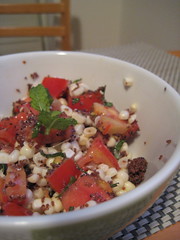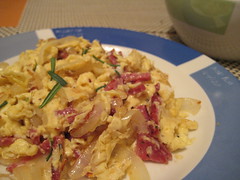Recently, my company sent out a firmwide email about the new color-coded bins for recycling, composting, plastic bags, landfill, etc. Shortly thereafter, I heard a chorus of voices declaring it as a "waste of time" and "stupid" and even "they make garbage too complicated here. It's all the same, who cares." People will deny or look for fault in anything that challenges their lifestyle. If sorting trash is the right thing to do, then that implies we've been doing it wrong. But what's wrong with poverty, hunger, disease, water scarcity, and war? Those are just "personal virtues" anyway.
Thursday, August 27, 2009
Choice is an Illusion
Recently, my company sent out a firmwide email about the new color-coded bins for recycling, composting, plastic bags, landfill, etc. Shortly thereafter, I heard a chorus of voices declaring it as a "waste of time" and "stupid" and even "they make garbage too complicated here. It's all the same, who cares." People will deny or look for fault in anything that challenges their lifestyle. If sorting trash is the right thing to do, then that implies we've been doing it wrong. But what's wrong with poverty, hunger, disease, water scarcity, and war? Those are just "personal virtues" anyway.
Tuesday, August 25, 2009
A Terrifying (Unsurprising) Trend
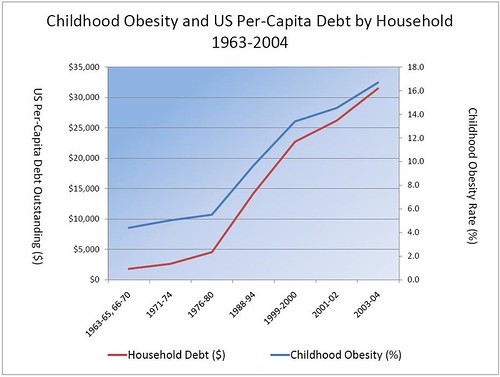
Tomorrow is getting closer.
Tuesday, August 18, 2009
The Golden Rule, err, Arches

Monday, August 17, 2009
Peach Pickles!
I could write about a million things right now, since I just returned from my good friend Katie's farm in Cranston, RI where I've been working and playing and swimming and eating for the past week and a half.
Thursday, August 13, 2009
Blistered in the Sun

Been really busy lately and haven't had much time to post, but tonight came home and decided it was time to get busy in the kitchen. Had some beautiful lamb in the freezer, and our fridge was loaded with farmers market produce. This included some baby eggplants that were calling to me. Lamb+eggplant is a natural combination. So here's the menu:
• Local red lettuce and tomato salad with sprouts and sweet peppers; dijon-balsamic vinaigrette
• Roasted "Charmoula" marinated lamb loin, with mint-garlic pesto, on eggplant-garlic-pepper puree.
• Corn on the cob
• Blistered shishito peppers with pink sea salt
Not going to post full recipes here, but here are some details.
"Charmoula" is a somewhat generic term for a north-African olive oil based spice paste, that generally includes ground chilies, cumin, salt, garlic, lemon, onion, coriander, saffron, etc. For this particular spice paste, I used:
olive oil
pimenton (smoked Spanish paprika)
sweet paprika
ground cumin
minced garlic
cayenne
allspice
ground black pepper
turmeric
kosher salt
dash of white wine vinegar (didn't have a lemon, but needed acid)
The eggplant puree was actually one of the best concoctions I've come up with in a while. Started by blackening the eggplants on all sides in a cast-iron skillet. After about 20 minutes, I let them cool, then peeled them and scooped out the softened flesh. Next, pureed in a food-processor with a little bit of salt and pepper. Meanwhile, sauteed finely diced garlic, hot peppers, sweet peppers, and zucchini until all were softened (but still slightly firm), and folded it all together. This creamy, spicy-sweet puree was a perfect compliment to the lamb (but tasty as hell on it's own)
The pesto was just fresh mint, olive oil, and garlic with a bit of fresh black pepper. Brightened the whole thing up and transformed a pretty comforting meal into a much more summery affair.
Shishito peppers are the closest thing to pimientos you can get around here. These small, tender, slightly spicy peppers are best prepared simply: tossed with a bit of olive oil, and blistered in a hot cast-iron skillet (or grilled), and tossed with a bit of sea salt. I have to get them fast.... Dunnie will make these disappear in a flash.

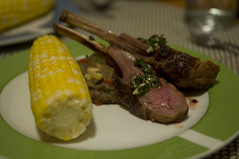
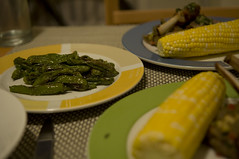
(You can see I got jipped on these suckers!)

A Note on Nutrition
Wednesday, August 5, 2009
Farm(ers Market) to Table
Farm Food
Originally uploaded by Utter Brandomonium
Both last night and tonight, dinner preparation had a dual purpose: make something to eat, and to use up some (slightly) aging produce. Tonight's was not your run-of-the-mill dinner by any means. A farm egg scramble with the unbelievable eggs from Knoll Crest Farms, some Salumi, spring onions and rosemary from my window. And a salad of early tomatoes, raw sweet corn, red quinoa (brought back from Peru!), fresh mint, and chili flakes. YUM!
Conviction.

A recent interview with Joel Salatin (of The Omnivores Dilemma and Food, Inc. fame) about farming, food, tolerance, sustainability and how to relax was posted on treehugger.com. If you can put aside the stigma associated with the website's name, this is an amazing piece.
Tuesday, August 4, 2009
Greater Than the Sum of it's Parts

Jim Giles of the New Scientist published this article in response to the story I already reacted to, stating that organic food is no better than conventional. Thank you Jim!
